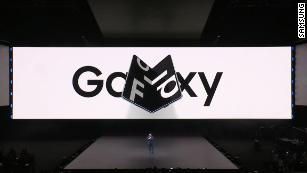
One of my first mobile devices was a 2005 LG flip phone. It was so small I could close both of hands around it and flick it open with one thumb. It taught me a most valuable lesson: how to be patient when logging onto the internet.
When Samsung announced on Wednesday the Galaxy Fold — a luxury foldable smartphone that turns into a tablet — I had flashbacks of life before Apple changed everything with the iPhone; a simpler time when a phone was still just a tool, not a screen we stared at every day.
Although the design of the Galaxy Fold is a throwback to the flip phone concept, it's far from where we started. It's big, it's smart and it's what Samsung calls the future.
Samsung has been working on a foldable phone for years and showed off its Infinity Flex screen for the first time in November. Google later confirmed its Android mobile software will support folding display.
The Galaxy Fold is a 4.6 inch-smartphone that opens up into a 7.4-inch tablet. Along with the Infinity Flex display, it has a hinge system that can't be seen from the outside. The device, which will cost a hefty $1,980, hits stores on April 26. It'll run on Android 9.0 and be available in four colors (black, silver, green and blue).
"We are creating a new dimension for your phone and your life," a Samsung spokesperson said during the event. "It doesn't even define a new category; it defies a new category."
According to Ramon Llamas, research director at IDC, it makes sense for the company to shake up the market considering smartphone sales have plateaued in terms of both sales and features.
"We've been looking at iterations of variations of a theme we've seen already," Llamas said. "We've seen big phones, great cameras and awesome processors. So where do we go next?"
Samsung has a reputation for taking risks -- it was one of the first companies to roll out larger-sized smartphones -- but these efforts don't always work.
"The strategy [now] is to find a phone that isn't out there today, and it may not appeal to everyone but it may appeal to some, and that's OK," Llamas said.
Consumers who flock to big screens, whether for gaming or the ability to see more of their data in one place, may be attracted to the Galaxy Fold. It uniquely supports three apps at one time: You can watch Netflix(NFLX), Google (GOOG) something and answer text messages at the same time.
Samsung has already proven there's interest around larger-screen smartphones with the success of its Galaxy Note line.
"Samsung is onto something because people have a smartphone and a tablet and a PC, but what if you could have two things in one and you don't need all of those devices anymore?" Llamas said.
Ben Wood, research director of CCS Insight, agrees, noting a move like this makes Samsung stand out as innovation leader.
"Unveiling a product ahead of rivals is an important milestone," Wood told CNN Business ahead of the launch event. "It feels like we're in the Stone Age when it comes to products with flexible screens. This isn't a criticism but merely an observation. We're seeing the first very tentative steps toward the implementation of a technology that may seem to be a solution looking for a problem now, but is likely to become a pillar of designs of consumer electronic devices in the future."
Wood expects Samsung's foldable smartphone will be a magnet for gadget lovers but warns the inevitable high cost and trade-offs in usability will limit its appeal initially.
"Personally, I'm more interested in a tablet I can fold up than a smartphone I can fold open," Wood said. "The current form factor for smartphones works pretty well and the hinge on a folding device will add some bulk. But over time I'm sure it will become a more normal design approach on smartphones."
Samsung will also need to convince developers to design apps for the unique form factor, and consumer demand out of the gate might not be enough to encourage this.
But Samsung isn't the only company putting significant resources behind a foldable future. Huawei is expected to debut a flexible smartphone in March, while Motorola is reportedly readying a flip RAZR smartphone. Intel and Microsoft are also rumored to working on foldable concepts for the tablet PC and laptop markets.
The design of foldable phones may be a nod to the past but these efforts, whether they take off or not, are hardly a step back.




No comments:
Post a Comment